 полная версия
полная версияComic History of the United States
In 1820 Maine was separated from Massachusetts. Maine is noted for being the easternmost State in the Union, and has been utilized by a number of eminent men as a birthplace. White-birch spools for thread, Christmas-trees, and tamarack and spruce-gum are found in great abundance. It is the home of an industrious and peace-loving people. Bar Harbor is a cool place to go to in summer-time and violate the liquor law of the State.
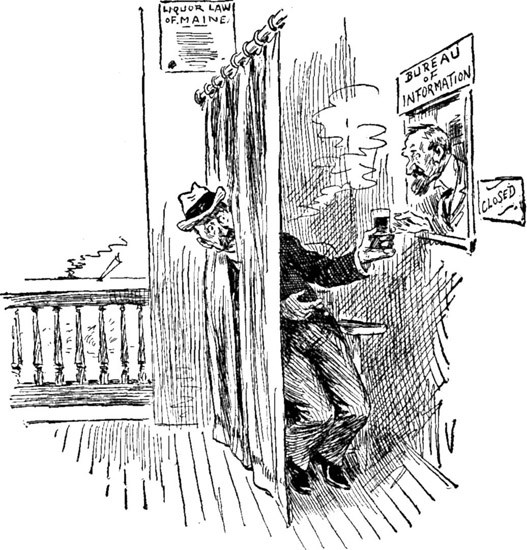
SEDUCTIONS OF BAR HARBOR.
The Dutch were first to claim Connecticut. They built a trading-post at Hartford, where they swapped bone collar-buttons with the Indians for beaver-and otter-skins. Traders from Plymouth who went up the river were threatened by the Dutch, but they pressed on and established a post at Windsor.
In 1635, John Steele led a company "out west" to Hartford, and Thomas Hooker, a clergyman, followed with his congregation, driving their stock before them. Hartford thus had quite a boom quite early in the seventeenth century. The Dutch were driven out of the Connecticut Valley, and began to look towards New York.
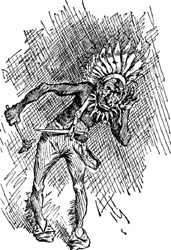
PEQUOD INDIAN ON THE WAR-PATH.
Soon after this the Pequod War broke out. These Indians had hoped to form an alliance with the Narragansetts, but Roger Williams prevented this by seeing the Narragansett chief personally. Thus the Puritans had coals of fire heaped on their heads by their gentle pastor, until the odor of burning hair could be detected as far away as New Haven.
The Pequods were thus compelled to fight alone, and Captain Mason by a coup d'état surrounded their camp before daylight and entered the palisades with the Indian picket, who cried out "Owanux! Owanux!" meaning "Englishmen. Englishmen." Mason and his men killed these Pequods and burned their lodges to the ground. There has never been a prosperous Pequod lodge since. Those who escaped to the forest were shot down like jack-rabbits as they fled, and there has been no Pequoding done since that time.
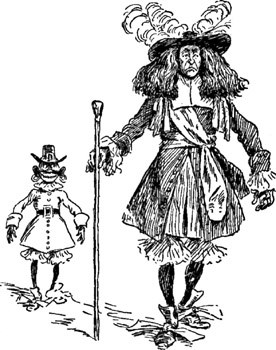
GOVERNOR ANDROS.
The New Haven Colony was founded in 1638 by wealthy church members from abroad. They took the Bible as their standard and statute. They had no other law. Only church members could vote, which was different from the arrangements in New York City in after-years.
The Connecticut Colony had a regular constitution, said to have been the first written constitution ever adopted by the people, framed for the people by the people. It was at once prosperous, and soon bought out the Saybrook Colony.
In 1662 a royal charter was obtained which united the two above colonies and guaranteed to the people the rights agreed upon by them. It amounted to a duly-authenticated independence. A quarter of a century afterwards Governor Andros, in his other clothes and a reigning coat of red and gold trimmings, marched into the Assembly and demanded this precious charter.
A long debate ensued, and, according to tradition, while the members of the Assembly stood around the table taking a farewell look at the charter, one of the largest members of the house fell on the governor's breast and wept so copiously on his shirt-frill that harsh words were used by his Excellency; a general quarrel ensued, the lights went out, and when they were relighted the charter was gone.
Captain Wadsworth had taken it and concealed it in a hollow tree, since called the Charter Oak. After Andros was ejected from the Boston office, the charter was brought out again, and business under it was resumed.
Important documents, however, should not be, as a general thing, secreted in trees. The author once tried this while young, and when engaged to, or hoping to become engaged to, a dear one whose pa was a singularly coarse man and who hated a young man who came as a lover at his daughter's feet with nothing but a good education and his great big manly heart. He wanted a son-in-law with a brewery; and so he bribed the boys of the neighborhood to break up a secret correspondence between the two young people and bring the mail to him. This was the cause of many a heart-ache, and finally the marriage of the sweet young lady to a brewer who was mortgaged so deeply that he wandered off somewhere and never returned. Years afterwards the brewery needed repairs, and one of the large vats was found to contain all of the missing man that would not assimilate with the beer,—viz., his watch. Quite a number of people at that time quit the use of beer, and the author gave his hand in marriage to a wealthy young lady who was attracted by his gallantry and fresh young beauty.
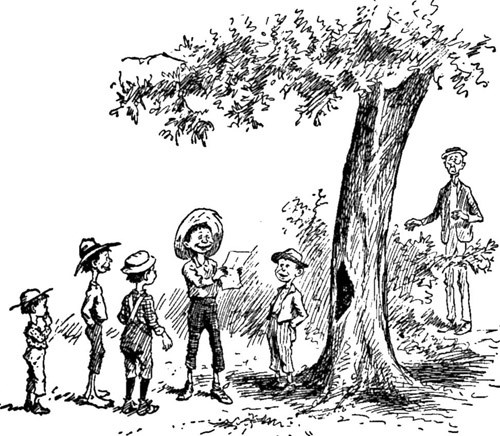
NYE'S CHARTER OAK.
Roger Williams now settled at Providence Plantation, where he was joined by Mrs. Hutchinson, who also believed that the church and state should not be united, but that the state should protect the church and that neither should undertake to boss the other. It was also held that religious qualifications should not be required of political aspirants, also that no man should be required to whittle his soul into a shape to fit the religious auger-hole of another.
This was the beginning of Rhode Island. She desired at once to join the New England Colony, but was refused, as she had no charter. Plymouth claimed also to have jurisdiction over Rhode Island. This was very much like Plymouth.
Having banished Roger Williams and Mrs. Hutchinson to be skinned by the Pequods and Narragansetts over at Narragansett Pier, they went on about their business, flogging Quakers, also ducking old women who had lumbago, and burning other women who would not answer affirmatively when asked, "Be you a witch?"
Then when Roger began to make improvements and draw the attention of Eastern capital to Rhode Island and to organize a State or Colony with a charter, Plymouth said, "Hold on, Roger: religiously we have cast you out, to live on wild strawberries, clams, and Indians, but from a mercantile and political point of view you will please notice that we have a string which you will notice is attached to your wages and discoveries."
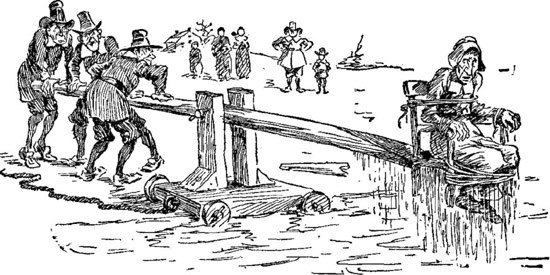
DUCKING OLD WOMEN.
Afterwards, however, Roger Williams obtained the necessary funds from admiring friends with which to go to England and obtain a charter which united the Colonies yet gave to all the first official right to liberty of conscience ever granted in Europe or America. Prior to that a man's conscience had a brass collar on it with the royal arms engraved thereon, and was kept picketed out in the king's grounds. The owner could go and look at it on Sundays, but he never had the use of it.
With the advent of freedom of political opinion, the individual use of the conscience has become popularized, and the time is coming when it will grow to a great size under our wise institutions and fostering skies. Instead of turning over our consciences to the safety deposit company of a great political party or religious organization and taking the key in our pocket, let us have individual charge of this useful little instrument and be able finally to answer for its growth or decay.
The author wishes to extend his thanks for the use of books of reference used in the collection of the foregoing facts; among them, "How to Pay Expenses though Single," by a Social Leper, "How to Keep Well," by Methuselah, "Humor of Early Days," by Job, "Dangers of the Deep," by Noah, "General Peacefulness and Repose of the Dead Indian," by General Nelson A. Miles, "Gulliver's Travels," and "Life and Public Services of the James Boys."
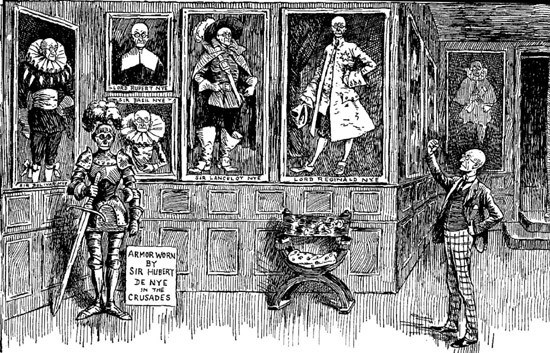
NYE IN HIS FAMILY GALLERY.
CHAPTER VII.
THE DISCOVERY OF NEW YORK
The author will now refer to the discovery of the Hudson River and the town of New York via Fort Lee and the 125th Street Ferry.
New York was afterwards sold for twenty-four dollars,—the whole island. When I think of this I go into my family gallery, which I also use as a swear room, and tell those ancestors of mine what I think of them. Where were they when New York was sold for twenty-four dollars? Were they having their portraits painted by Landseer, or their deposition taken by Jeffreys, or having their Little Lord Fauntleroy clothes made?
Do not encourage them to believe that they will escape me in future years. Some of them died unregenerate, and are now, I am told, in a country where they may possibly be damned; and I will attend to the others personally.
Twenty-four dollars for New York! Why, my Croton-water tax on one house and lot with fifty feet four and one-fourth inches front is fifty-nine dollars and no questions asked. Why, you can't get a voter for that now.
Henry—or Hendrik—Hudson was an English navigator, of whose birth and early history nothing is known definitely, hence his name is never mentioned in many of the best homes in New York.
In 1607 he made a voyage in search of the Northwest Passage. In one of his voyages he discovered Cape Cod, and later on the Hudson River.
This was one hundred and seventeen years after Columbus discovered America; which shows that the discovering business was not pushed as it should have been by those who had it in charge.
Hudson went up the river as far as Albany, but, finding no one there whom he knew, he hastened back as far as 209th Street West, and anchored.
He discovered Hudson Bay and Hudson Strait, and made other journeys by water, though aquatting was then in its infancy. Afterwards his sailors became mutinous, and set Hendrik and his son, with seven infirm sailors, afloat.
Ah! Whom have we here? (See next page.)
It is Hendrik Hudson, who discovered the Hudson River.
Here he has just landed at the foot of 209th Street, New York, where he offered the Indians liquor, but they refused.
How 209th Street has changed!
The artist has been fortunate in getting the expression of the Indians in the act of refusing. Mr. Hudson's great reputation lies in the fact that he discovered the river which bears his name; but the thinking mind will at once regard the discovery of an Indian who does not drink as far more wonderful.
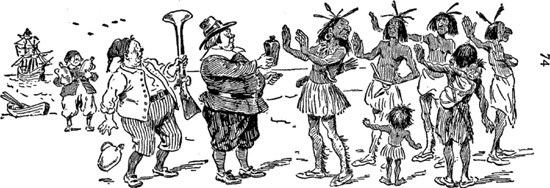
DISCOVERY OF TEMPERANCE INDIANS.
Some historians say that this especial delegation was swept away afterward by a pestilence, whilst others commenting on the incident maintain that Hudson lied.
It is the only historical question regarding America not fully settled by this book.
Nothing more was heard of him till he turned up in a thinking part in "Rip Van Winkle."
Many claims regarding the discovery of various parts of the United States had been previously made. The Cabots had discovered Labrador, the Spaniards the southern part of the United States; the Norsemen had discovered Minneapolis, and Columbus had discovered San Salvador and gone home to meet a ninety-day note due in Palos for the use of the Pinta, which he had hired by the hour.
But we are speaking of the discovery of New York.
About this time a solitary horseman might have been seen at West 209th Street, clothed in a little brief authority, and looking out to the west as he petulantly spoke in the Tammany dialect, then in the language of the blank-verse Indian. He began, "Another day of anxiety has passed, and yet we have not been discovered! The Great Spirit tells me in the thunder of the surf and the roaring cataract of the Harlem that within a week we will be discovered for the first time."
As he stands there aboard of his horse, one sees that he is a chief in every respect and in life's great drama would naturally occupy the middle of the stage. It was at this moment that Hudson slipped down the river from Albany past Fort Lee, and, dropping a nickel in the slot at 125th Street, weighed his anchor at that place. As soon as he had landed and discovered the city, he was approached by the chief, who said, "We gates. I am one of the committee to show you our little town. I suppose you have a power of attorney, of course, for discovering us?"
"Yes," said Hudson. "As Columbus used to say when he discovered San Salvador, 'I do it by the right vested in me by my sovereigns.' 'That oversizes my pile by a sovereign and a half,' says one of the natives; and so, if you have not heard it, there is a good thing for one of your dinner-speeches here."
"Very good," said the chief, as they jogged down-town on a swift Sixth Avenue elevated train towards the wigwams on 14th Street, and going at the rate of four miles an hour. "We do not care especially who discovers us, so long as we hold control of the city organization. How about that, Hank?"
"That will be satisfactory," said Mr. Hudson, taking a package of imported cheese and eating it, so that they could have the car to themselves.
"We will take the departments, such as Police, Street-Cleaning, etc., etc., etc., while you and Columbus get your pictures on the currency and have your graves mussed up on anniversaries. We get the two-moment horses and the country châteaux on the Bronx. Sabe?"
"That is, you do not care whose portrait is on the currency," said Hudson, "so you get the currency."
Said the man, "That is the sense of the meeting."
Thus was New York discovered via Albany and Fort Lee, and five minutes after the two touched glasses, the brim of the schoppin and the Manhattan cocktail tinkled together, and New York was inaugurated.
Obtaining a gentle and philanthropical gentleman who knew too well the city by gas-light, they saw the town so thoroughly that nearly every building in the morning wore a bright red sign which read—

Regarding the question as to who has the right to claim the priority of discovery of New York, I unite with one of the ablest historians now living in stating that I do not know.
Here and there throughout the work of all great historians who are frank and honest, chapter after chapter of information like this will burst forth upon the eye of the surprised and delighted reader.
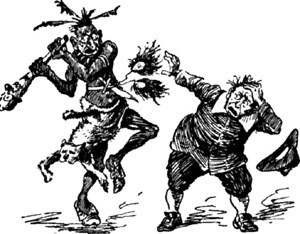
CLUB LIFE IN EARLY NEW YORK.
Society at the time of the discovery of the blank-verse Indian of America was crude. Hudson's arrival, of course, among older citizens soon called out those who desired his acquaintance, but he noticed that club life was not what it has since become, especially Indian club life.
He found a nation whose regular job was war and whose religion was the ever-present prayer that they might eat the heart of their enemy plain.
The Indian High School and Young Ladies' Seminary captured by Columbus, as shown in the pictures of his arrival at home and his presentation to the royal pair one hundred and seventeen years before this, it is said, brought a royal flush to the face of King Ferdie, who had been well brought up.
This can be readily understood when we remember that the Indian wore at court a court plaster, a parlor-lamp-shade in stormy weather, made of lawn grass, or a surcingle of front teeth.
They were shown also in all these paintings as graceful and beautiful in figure; but in those days when the Pocahontas girls went barefooted till the age of eighty-nine years, chewed tobacco, kept Lent all winter and then ate a brace of middle-aged men for Easter, the figure must have been affected by this irregularity of meals.
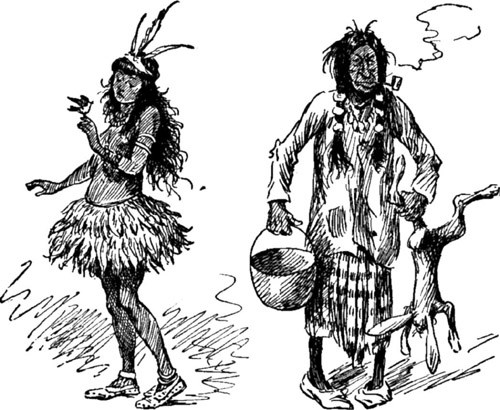
THE INDIAN GIRL OF STORY.—THE INDIAN GIRL OF FACT.
Unless the Pocahontas of the present day has fallen off sadly in her carriage and beauty, to be saved from death by her, as Smith was, and feel that she therefore had a claim on him, must have given one nervous prostration, paresis, and insomnia.
The Indian and the white race never really united or amalgamated outside of Canada. The Indian has always held aloof from us, and even as late as Sitting Bull's time that noted cavalry officer said to the author that the white people who simply came over in the Mayflower could not marry into his family on that ground. He wanted to know why they had to come over in the Mayflower.
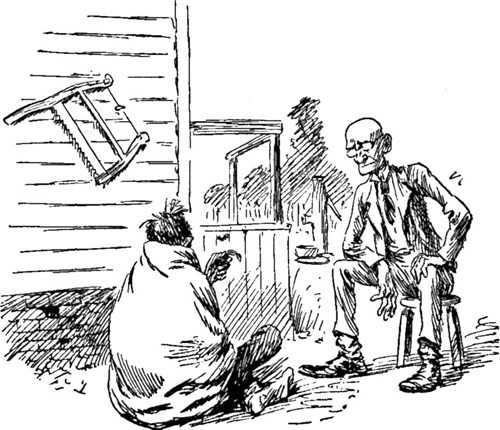
BILL NYE CONVERSING WITH SITTING BULL.
"We were here," said the aged warrior, as he stole a bacon-rind which I used for lubricating my saw, and ate it thoughtfully, "we were here and helped Adam 'round up' and brand his animals. We are an old family, and never did manual labor. We are just as poor and proud and indolent as those who are of noble blood. We know we are of noble blood because we have to take sarsaparilla all the time. We claim to come by direct descent from Job, of whom the inspired writer says,—
"Old Job he was a fine young lad,Sing Glory hallelujah.His heart was good, but his blood was bad,Sing Glory hallelujah."3CHAPTER VIII.
THE DUTCH AT NEW AMSTERDAM
Soon after the discovery of the Hudson, Dutch ships began to visit that region, to traffic in furs with the Indians. Some huts were erected by these traders on Manhattan Island in 1613, and a trading-post was established in 1615. Relics of these times are frequently turned up yet on Broadway while putting in new pipes, or taking out old pipes, or repairing other pipes, or laying plans for yet other pipes, or looking in the earth to see that the original pipes have not been taken away.
Afterwards the West India Company obtained a grant of New Netherland, and New Amsterdam was fairly started. In 1626, Minuit, the first governor, arrived, and, as we have stated, purchased the entire city of New York of the Indians for twenty-four dollars.
Then trouble sprang up between the Dutch and the Swedes on the Delaware over the possession of Manhattan, and when the two tribes got to conversing with each other over their rights, using the mother-tongue on both sides, it reminded one of the Chicago wheat market when business is good. The English on the Connecticut also saw that Manhattan was going to boom as soon as the Indians could be got farther west, and that property would be high there.
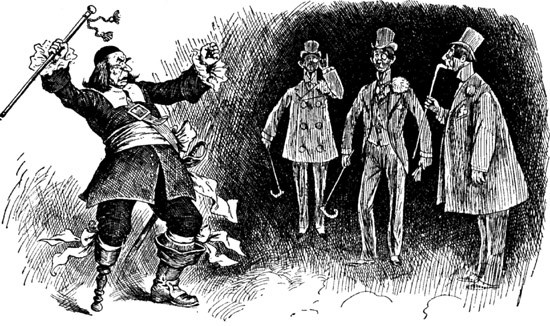
STUYVESANT'S VISION.
Peter Stuyvesant was the last Dutch governor of New York. He was a relative of mine. He disliked the English very much. They annoyed him with their democratic ideas and made his life a perfect hell to him. He would be sorry to see the way our folks have since begun to imitate the English. I can almost see him rising in his grave to note how the Stuyvesants in full cry pursue the affrighted anise-seed bag, or with their coaching outfits go tooling along 'cross country, stopping at the inns on the way and unlimbering their portable bath-tubs to check them with the "clark."
Pete, you did well to die early. You would not have been happy here now.
While Governor Stuyvesant was in hot water with the English, the Swedes, and the Indians, a fleet anchored in the harbor and demanded the surrender of the place in the name of the Duke of York, who wished to use it for a game preserve. After a hot fight with his council, some of whom were willing even then to submit to English rule and hoped that the fleet might have two or three suits of tweed which by mistake were a fit and therefore useless to the owners, and that they might succeed in swapping furs for these, the governor yielded, and in 1664 New York became a British possession, named as above.
The English governors, however, were not popular. They were mostly political hacks who were pests at home and banished to New York, where the noise of the streets soon drove them to drink. For nine years this sort of thing went on, until one day a Dutch fleet anchored near the Staten Island brewery and in the evening took the town.
However, in the year following, peace was restored between England and Holland, and New Amsterdam became New York again, also subject to the Tammany rule.
Andros was governor for a time, but was a sort of pompous tomtit, with a short breath and a large aquiline opinion of himself. He was one of the arrogant old pie-plants whose growth was fostered by the beetle-bellied administration at home. He went back on board the City of Rome one day, and did not return.

DUKE OF YORK.
New York had a gleam of hope for civil freedom under the rule of the Duke of York and the county Democracy, but when the duke became James II. he was just like other people who get a raise of salary, and refused to be privately entertained by the self-made ancestry of the American.
He was proud and arrogant to a degree. He forbade legislation, and stopped his paper. New York was at this time annexed to the New England Colony, and began keeping the Sabbath so vigorously that the angels had great difficulty in getting at it.
Nicholson, who was the lieutenant tool of iniquity for Andros, fled with him when democracy got too hot for them. Captain Leisler, supported by Steve Brodie and everything south of the Harlem, but bitterly opposed by the aristocracy, who were distinguished by their ability to use new goods in making their children's clothes, whereas the democracy had to make vests for the boys from the cast-off trousers of their fathers, governed the province until Governor Sloughter arrived.
Sloughter was another imported Smearkase in official life, and arrested Leisler at the request of an aristocrat who drove a pair of bang-tail horses up and down Nassau Street on pleasant afternoons and was afterwards collector of the port. Having arrested Leisler for treason, the governor was a little timid about executing him, for he had never really killed a man in his life, and he hated the sight of blood; so Leisler's enemies got the governor to take dinner with them, and mixed his rum, so that when he got ready to speak, his remarks were somewhat heterogeneous, and before he went home he had signed a warrant for Leisler's immediate execution.
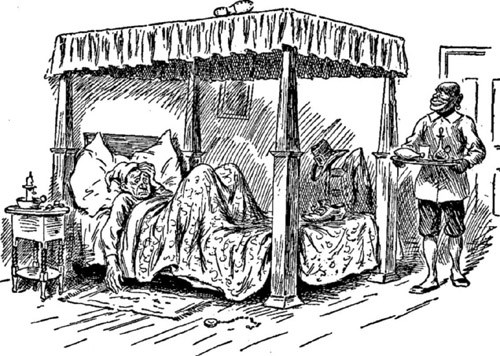
GOVERNOR SLOUGHTER'S PAINFUL AWAKENING.
When he awoke in the morning at his beautiful home on Whitehall Street, the sun was gayly glinting the choppy waves of Buttermilk Channel, and by his watch, which had run down, he saw that it was one o'clock, but whether it was one o'clock A.M. or P.M. he did not know, nor whether it was next Saturday or Tuesday before last. Oh, how he must have felt!
His room was dark, the gas having gone out to get better air. He attempted to rise, but a chill, a throb, a groan, and back he lay hastily on the bed just as it was on the point of escaping him. Suddenly a thought came to him. It was not a great thought, but it was such a thought as comes to those who have been thoughtless. He called for a blackamoor slave from abroad who did chores for him, and ordered a bottle of cooking brandy, then some club soda he had brought from London with him. Next he drank a celery-glass of it, and after that he felt better. He then drank another.
"Keep out of the way of this bed, Julius," he said. "It is coming around that way again. Step to one side, Julius, please, and let the bed walk around and stretch its legs. I never saw a bed spread itself so," he continued, seeming to enjoy his own Lancashire humor. "All night I seemed to feel a great pain creeping over me, Julius," he said, hesitatingly, again filling his celery-glass, "but I see now that it was a counterpane."







